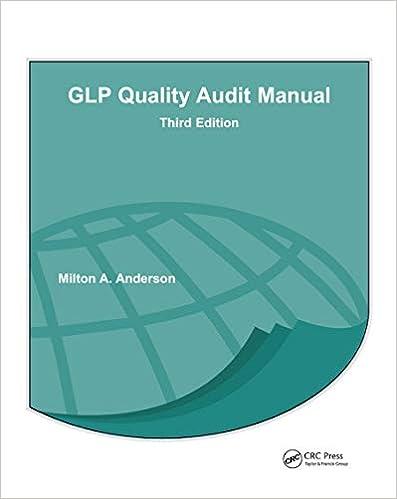Question
During training for your new job in public accounting, your audit manager asked you to write a memorandum (addressed to the audit manager make up
During training for your new job in public accounting, your audit manager asked you to write a memorandum (addressed to the audit manager make up a name) that addresses the following: 1. What is the definition of Professional Skepticism as detailed in PCAOB AS 1015?
2. What is the definition of Professional Skepticism as detailed in AICPA AU-C Sec. 200?
3. Why is Professional Skepticism important to the audit process? What are the barriers to applying professional skepticism?
4. Using PCAOB Auditing Standards, summarize the Description and Characteristics of Fraud. How does consideration of Fraud in the audit relate to exercising professional skepticism?
5. Using PCAOB Auditing Standards, summarize the Responsibilities and Functions of the independent auditor and how these responsibilities differ from Management? How do these differing responsibilities relate to the auditor exercising professional skepticism?
6. Read the specific facts and circumstances of the case study, identify the key red flags that heighten professional skepticism and evaluate what you would do next.
 Case Study A - Not Just a Trivial Item I joined a Big Four accounting firm straight out of college a few years ago as a staff accountant. My first assignment on an audit engagement was a learning experience I would never forget; it was a practical lesson perhaps even more valuable than my newly minted accounting degree. On our way to the client, Susan, a senior accountant and one of my new colleagues, cautioned me about the CFO: "He has a bit of a reputation," she said, adding, "Let me know if you have problems. Anc don't let him browbeat you!" That comment, as an introduction to my brand-new career, was just a little unsettling. I was given what seemed to be a nice, safe task: testing routine journal entries, which involved selecting items from the population and examining the supporting evidence. I asked a clerk for some reconciliations and a little later, to my surprise, I got a call from the CFO himself to ask why we were working on "trivial items," as he called it. "We hired you for the big picture, not this kind of stuff," was his terse comment, and he hung up before I could respond. We were under a tight deadline to get the audit completed, and after several days there was no sign of the reconciliations I'd requested. I talked to Susan and later Mike, the engagement partner. When I finally received the reconciliations and tested them, I noticed a high volume of journal entries that even to my inexperienced eyes seemed a little out of the ordinary
Case Study A - Not Just a Trivial Item I joined a Big Four accounting firm straight out of college a few years ago as a staff accountant. My first assignment on an audit engagement was a learning experience I would never forget; it was a practical lesson perhaps even more valuable than my newly minted accounting degree. On our way to the client, Susan, a senior accountant and one of my new colleagues, cautioned me about the CFO: "He has a bit of a reputation," she said, adding, "Let me know if you have problems. Anc don't let him browbeat you!" That comment, as an introduction to my brand-new career, was just a little unsettling. I was given what seemed to be a nice, safe task: testing routine journal entries, which involved selecting items from the population and examining the supporting evidence. I asked a clerk for some reconciliations and a little later, to my surprise, I got a call from the CFO himself to ask why we were working on "trivial items," as he called it. "We hired you for the big picture, not this kind of stuff," was his terse comment, and he hung up before I could respond. We were under a tight deadline to get the audit completed, and after several days there was no sign of the reconciliations I'd requested. I talked to Susan and later Mike, the engagement partner. When I finally received the reconciliations and tested them, I noticed a high volume of journal entries that even to my inexperienced eyes seemed a little out of the ordinary Step by Step Solution
There are 3 Steps involved in it
Step: 1

Get Instant Access to Expert-Tailored Solutions
See step-by-step solutions with expert insights and AI powered tools for academic success
Step: 2

Step: 3

Ace Your Homework with AI
Get the answers you need in no time with our AI-driven, step-by-step assistance
Get Started


